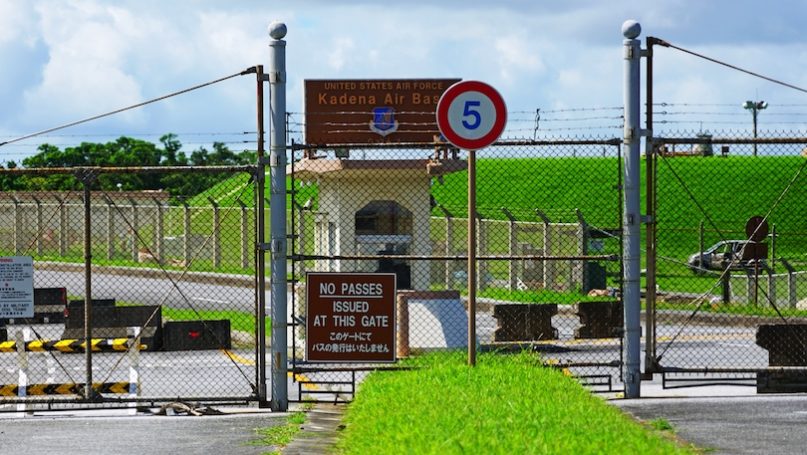Timothy S. Rich and Mallory Hardesty

Maintaining bases abroad has become more controversial not only with the American public, but also in host countries. While the US benefits from increased influence and often a foreign policy in line with American interests, the perceived costs may outpace perceived gains Americans. Meanwhile, hosting bases creates a myriad of environmental, economic, and political problems for the host country that influence depress public support. Existing work shows variation by country in public perceptions of the US military presence, although local populations often acknowledge the presence as a deterrence against regional aggressors.
Often missing in discussions of bases abroad is whether the public differentiates among military commitments by location. While the American public may have concerns about overall military spending and indefinite deployments in political unstable countries, evidence seems to suggest broader support for deployments in traditional allies. For example, a 2021 Chicago Council survey finds 63% supported defending South Korea if North Korea invades with a 2018 Chicago Council survey finding 65% support maintaining bases in Japan and 64% support defending Japan against a North Korean attack.
Based on the Department of Defense’s Defense Manpower Data Center, the US had 171,477 service members abroad in 2021. Most troops in were in Japan (53,700), Germany (33,900) and South Korea (26,400). However, this does not capture the civilian population of bases as well. For example, the largest of the 73 US bases in South Korea, Camp Humphreys, hosts over 35,000 military and civilian personnel.
Besides the longstanding presence of bases in these three countries, all three were targets of the Trump administration’s criticism of allies not paying their fair share. The administration threatened to reduce the number of US troops in Japan and South Korea if they did not pay more of the costs, demanding a near 400% increase in cost-share. The Biden administration ultimately negotiated a 14% increase in payments from South Korea. Trump’s planned troop reduction in Germany was reversed under the Biden administration, while the latter in 2021 launched a review of current US bases abroad as a means potentially to restructure and downsize overseas commitments.
To address public perceptions, we conducted an original national web survey in the US June 29–July 11 via Qualtrics with quota sampling for age, gender, and geographic region. We randomly assigned 1,728 Americans to one of three yes or no questions about US bases: Version 1: Should the US close its military bases in Germany? Version 2: Should the US close its military bases in South Korea? Version 3: Should the US close its military bases in Japan?
Overall, we found that over 70% of respondents opposed to closing any of the bases. Broken down by political party, we see again broad opposition to base closures, although with some noticeable variation. Democrats were most supportive of closing bases in Germany (32.14%) while 33.33% of Republicans favored closing bases in South Korea. These rates regarding South Korea are similar to 2020 survey findings on troop withdrawals.
We also asked respondents to rate all three countries on a 1–10 scale, with 1 being very negative and 10 very positive. All three received similar ratings (South Korea: 6.06; Japan: 6.41; Germany 6.47). Unsurprisingly, those who evaluated the countries the lowest (1) were the most supportive of closing bases, with rates at least 15 percentage points lower among those evaluating each country higher.
In addition, we asked respondents, “Which of the following best describes your view of the US role in world affairs? 1) We should pay less attention to problems overseas and concentrate on problems at home or 2) It’s best for the future of our country to be active in world affairs. A clear partisan divergence emerges, with 56.29% of Democrats but only 32.66% of Republicans choosing to be active in world affairs. As expected, those who said the US should concentrate its attention domestically were more likely to support closing bases in each country than those supportive of engagement (Germany: 34.44% vs. 19.53%; South Korea: 36.09% vs. 17.87%; Japan: 32.7% vs. 18.73%). Yet again, even among the most who wished to focus inward, clear majorities did not support closing bases.
The results suggest that, despite concerns about the costs of military commitments, especially in aftermath of deployments in Iraq and Afghanistan, the public remains largely supportive of continued bases in these stable democracies. That all three are entrenched democracies, long-term allies, and face identifiable regional security challenges likely shapes how the American public views the costs and benefits of continued military commitments.
In an era of rising global tensions, it makes sense that many Americans may see these bases in particular as a means to respond quickly to changing security conditions and may serve to deter aggression altogether. With continued security concerns over Russia’s invasion of Ukraine, China’s threats to invade Taiwan, and North Korea’s missile tests, the Biden administration should emphasize the historical importance of America’s military commitments. At the same time, the administration should address broader domestic concerns about military expenditures by restructuring overseas commitments to address the changing nature of security threats in an economically responsible manner.
No comments:
Post a Comment